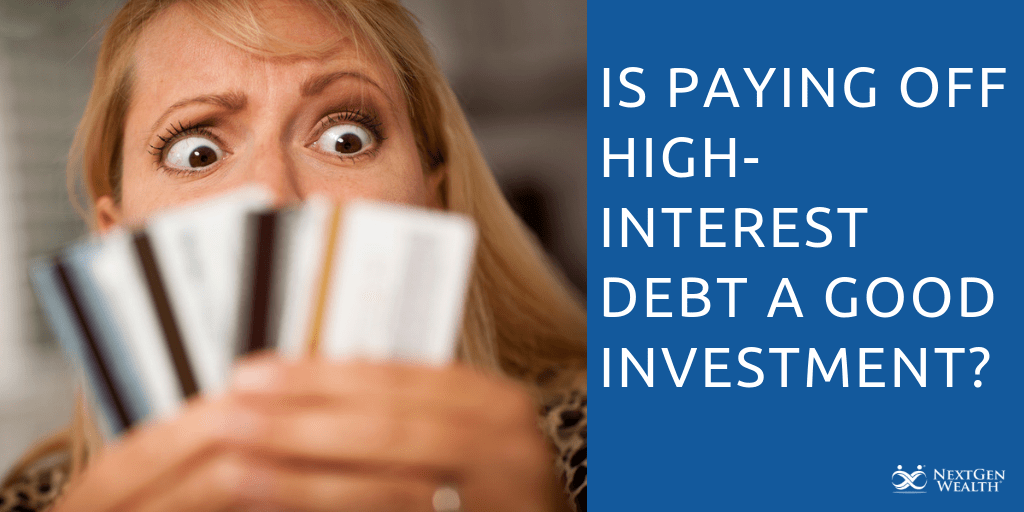Paying Off High-Interest Debt – Is It A Good Investment?
As an investor, you’re always on the lookout for the best possible returns with the least amount of risk. It just makes sense. But many experts say that paying off high-interest debt is one of your best investments - and I completely agree.
For example, suppose you are getting an average annual return of 8% from your investment portfolio. On the other hand, you are paying 19% annual interest on your credit card. In other words, you are spending roughly 11% more out of your pocket each year to service the interest on your credit card. Regardless of how you look it, you’re not getting ahead.
And, it might get worse. What if your returns go to 0% or even negative? If your investment returns go south, I can assure you that your credit card company will still be taking their 19% - doesn’t sound like a very good deal, does it?
In his interview with MarketWatch, billionaire Mark Cuban expressed his view on the best investment ever, "Paying off your credit cards. Paying off whatever debt you have."
"Whatever interest rate you have — it might be a student loan with a 7 percent interest rate — if you pay off that loan, you're making 7 percent. That's your immediate return, which is a lot safer than trying to pick a stock or trying to pick real estate, or whatever it may be," he added.
As an investor, your prime goal should be, as mentioned earlier, getting the best return with taking the least amount of risk. So, if you can pay off 19% interest with zero risk, you’re looking at a no-brainer investment.
Let’s check out the practical reasons why you should pay off your high-interest debt as fast as possbile.
It Will Reduce Financial Stress
Debt is a risk. It generates stress and uncertainty. In fact, most of the financial uncertainty we encounter is closely related to our debts.
Financial uncertainty can cause a whole lot of stress in your life. We all know too much stress can reduce our ability to do our job efficiently. So, ultimately it can hamper our life and even ruin a good night’s sleep.
If you focus on paying off your high-interest debts, you’ll be able to wipe out a large chunk of uncertainty in your life. This will, in turn, reduce stress, so you can start enjoying your life with confidence and happiness again. This will also allow you to start building up the other side of the balance sheet - your assets. Wouldn’t it be fun to start saving money for the things you really want:
- Retirement
- Home down payment
- Emergency fund
- Kids’ college
- Other life goals like a family vacation, wedding, home renovation, or big purchases like a car, bike, etc.
It Will Get You To Retirement Faster
If you pay off your high-interest debts, you can use the extra money you save and put it towards retirement. The great thing about putting more money into retirement is the worst thing that could happen is you get to retire early - or, as we like to say, achieve financial freedom.
So, that extra cash can make the difference. Even if you’re already contributing enough to your retirement bucket, I’m sure there are some other financial goals in your life you’d like to achieve.
It Will Free Up Cash Flow
Whenever you pay off debt, especially high-interest debt, the left side of your balance sheet improves thus allowing you to have more for the right side of your balance sheet...YOUR ASSETS!
Normally, when you’re making debt payments, it’s reducing your cash flow. If your income is $5,000 per month and you’re making high-interest debt payments of $2000, you’ve only got $3,000 leftover.
Paying off high-interest debt will give you the breathing space you’ve been dreaming about. You can use that money to spend more on fun things or use it for additional savings...I prefer to do a little of both.
Don’t Miss A Credit Card Payment
Missing your monthly debt payment or paying them after the due date will no doubt have a negative impact on your finances. Your credit score might take a hit, and that could make borrowing in the future even more difficult or impossible.
You might have to pay late fees and penalties, and that would only increase your repayment costs. You could even encounter a foreclosure or repossession of your assets if you fail to repay your debts.
Long story short, never miss a credit card payment...but, if you do, call them and ask for forgiveness. They’ll be willing the help the first couple times, but after that, it’s not so good.
It Will Improve Your Credit Score
Carrying a big debt burden can lower your credit rating. The closer your credit cards and loans are to your personal credit limit, the lower your score.
If you have a bad credit score, it can cost you thousands of dollars because you’re going to have to pay higher interest - it’s quite the slippery slope. Eventually, you’ll begin to feel completely trapped.
On the flip side though, the quicker you can pay off your debts, the quicker your credit score will improve. As a result, you can get access to these potential benefits:
- Lower interest rates on loans and credit cards
- Lower insurance premiums
- Better job opportunity
You Will Lock In A Guaranteed Rate Of Return
Whenever you pay off high-interest debt, you’re actually locking in a very good rate of return.
For example, suppose you have $10,000 in credit card debt with an average interest rate of 12%. If you pay off the credit card debt, you are effectively locking in a 12% rate of return on your money.
While you’re not exactly earning 12%, you’re still saving 12% by not having to pay that to the credit card company. The concept of saving money on interest equals your return on investment. The best thing is, that rate of return is guaranteed.
It Will Remove Unwanted Risk In Your Life
Debt, especially the high-interest kind, is always a risk when looking at your overall financial life. It can not only demolish it, but it may even result in a job loss which will only put you in the hole further.
Let’s face it, you might have to liquidate savings and investments to eventually become debt free. Once you’ve sold all of your assets and your cash flow is no longer sufficient, you’re now looking at a very difficult situation.
- Harassing calls from your creditors or debt collectors
- Getting legal judgment and wage garnishment
- High insurance premiums for minimum coverage
- Foreclosure and bankruptcy
All of your financial fopaux’s will be reflected in your credit report. If you miss your car payment, the lender could repossess your car. If you miss your mortgage payment, you might be looking at foreclosure.
If you fail to pay off your credit card debts, the creditor could file a lawsuit against you. As a result, the court might give a legal judgment and you may even face wage garnishment.
Sounds pretty awful, doesn’t it? Believe it or not but you also might lose the ability to find a new job. While these are the direst risks that can happen, they can and do happen every single day.
But that’s why it’s so important to focus on having a plan to paying off your high-interest debts as soon as possible. It won’t be easy, but it’s what’s needed to get you back on your track to financial independence.
This is a post from Clint Haynes, a Certified Financial Planner® and Financial Advisor in Kansas City, Missouri. He is also the founder and owner of NextGen Wealth. You can learn more about Clint at the website NextGen Wealth.


